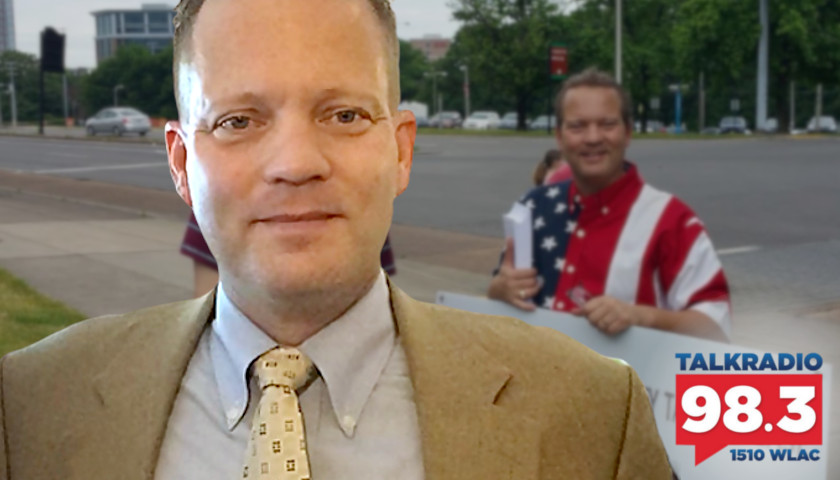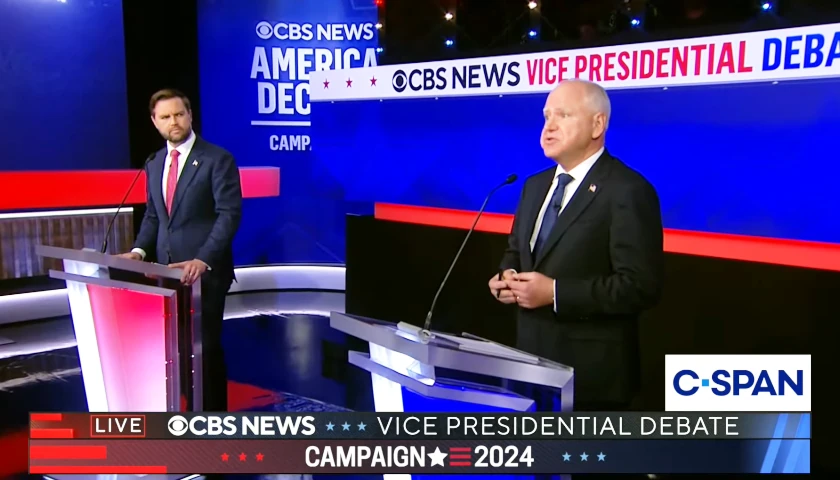Live from Music Row Friday morning on The Tennessee Star Report with Michael Patrick Leahy – broadcast on Nashville’s Talk Radio 98.3 and 1510 WLAC weekdays from 5:00 a.m. to 8:00 a.m. – host Leahy welcomed Nashville attorney Jim Roberts to the newsmakers line to give updates on petitions received and further details on the six amendments added.
Leahy: Crom Carmichael in studio with us and on the newsmaker line Jim Roberts who’s putting together the Nashville Taxpayer Protection Act. On the web at 4goodgovernment.com. Jim, good morning.
Roberts: Good morning to you!
Leahy: Well, tell us where we are on the sending out by mail those petitions. Did they go out? What kind of response are you getting?
Roberts: Well, we sent out about 230,000 petitions to pretty much every voter household in Davidson County. And they started arriving on Monday. And yesterday basically they started coming back in. People were excited. The number of people who received it and mailed it back to us the first day was really sort of stunning. I think we got a little over 300 petitions in yesterday. Which is a pretty good start. We are excited about that.
Carmichael: Now you have to get a larger number this time because of the number of people who voted in the last election. How many do you have to get this time?
Roberts: That’s right. Last time we collected 27,000 signatures. This time we need 33,000 and so we’re going to want to turn in 40 or 45 just to be on the safe side.
Carmichael: Okay, that’s a much heavier lift. Are you doing any other kind of promotions? What are you doing from a publicity standpoint because a lot of people if they get that they won’t know what it is and they’ll throw it away that would support you if they were paying more attention? So if they hear an ad and they’re told to go to 4goodgovernment.com. The petition is right there. Is that correct?
Roberts: That’s right. And so we’re using a variety of marketing which many people are familiar with it. They understand what we’re trying to do. They understand how hard Metro is fighting against it. So there’s a huge social media push. We’re going to do some radio advertising. There’s no television or anything like that. That’s too broad a medium. But basically, it’s about reaching out to voters. People who have a vested interest and not having their massive property tax increase. We think that people are familiar a little bit more this time with what we’re doing and we know they’re supportive.
Carmichael: I know they’re supportive but I was just saying that when they get the piece in the mail if they’ve got a bunch of other things in the mail that day, they might not even realize what it is. And so it let me ask a question. If somebody goes to 4goodgovernment.com and prints it out how many signatures do you need if I want to help you? If somebody wants to help you collect signatures are there places on that form for me to go to get other people to sign that petition?
Roberts: Absolutely. Every form has 10 signature lines that I would be eternally grateful if you would get all 10 of those signatures filled out. It actually makes it easier for us to count them because we can just put all the ones with tens signature in one stack into faster counting. We’ll want to turn these in when we get to about 40 to 45,000. That’s when we feel comfortable. And we’d rather have them turned in sooner versus later.
Leahy: Of the 300 that you’ve already received, how many have just one signature? How many of them have 10?
Roberts: Oh, it’s truthfully we didn’t count on that closely. There are about 600 signatures.
Leahy: Oh, good.
Roberts: So this is the very first day that they would have gotten back to us. So I take that as a really good sign. We should be getting in 800 or 900 a day going forward.
Carmichael: Now when people sign, like I have a nickname. My nickname is Crom. My real name is Oliver. Do I need to sign according to what my name is on the voter rolls?
Roberts: Yes. And it says as it appears on your voter registration card because that’s what they do. When they verify the signatures they use the voting records and they pull up names and they check the signatures. I mean they have a system to do that. So you want to use your name as it’s on the voter registration
Carmichael: If somebody’s real name is Robert and they go by Bob they should sign it Robert because that’s what’s likely on the voter rolls. Is that correct?
Roberts: That’s exactly right. I go by Jim but I sign things like that James.
Carmichael: But that’s another really good example that people need to take care of when they sign the petition and that they sign it with the proper name and then they just put their address. That’s pretty easy. Is there anything else they need to do besides put their name and address?
Roberts: Well, that’s it. I mean this is about getting it on the ballot for a vote. If you remember this isn’t going to make these things happen. There is going to be an election but we have to get it on the ballot. We have to collect a certain number of signatures. And this is the first process.
Leahy: Okay today, it’s February 12, 2021. You are targeting getting all these back by Friday, March 5, 2021. You hope to file the petition with Metro Clerk on Monday, March 8, and then the vote if this is all approved would be between May 28 and June 14. Do I have those dates correct?
Roberts: That’s right. We put two possible dates on there just because if we get a lot of petitions at the last second we might want to wait a little bit longer to turn them in and that might push the date back. It’s a sort of confusing way they set it up. But basically, you have to have the election scheduled 80 days after your turn in the signatures.
Leahy: The petition has six separate amendments. The one that people are probably most familiar with is number one. Property tax rates shall not increase more than three percent per fiscal year upon enactment without a voter referendum and you also would repeal in that the 34 percent property into that property tax increase that it is in effect this fiscal year. Is that right?
Roberts: Well, we like to use the word rollback. One of the things we ran into was that Metro complained about was the idea of repealing the existing tax. So that’s being litigated at the court of appeals level. But in order to give people release now we sort of decided the smartest thing to do is to say okay you got away with one year. We are going back to 2019 and we’re going to take it away from you going forward.
Leahy: So the language is rollback.
Roberts: Rollback. We’re going to roll it back to 2019 and Metro is going to have to constrain its spending and make some hard choices. But that’s their job.
Leahy: (Laughs) Well it may be their job making hard choices.
Carmichael: What is the one other items on your on the referendum?
Roberts: There are five different ones. One of the things we did differently instead of making it one big amendment we made it into six different amendments. There are provisions in there about protecting the voter charter amendment for one of the dishonest things that the Metro Council tried to do last time, and that was to pass its own charter amendment.
They sought to bring their own charter amendment and that was very confusing and very cryptic but had it passed would have undone everything that the Nashville Taxpayer Protection Act would have done. So they would have run a campaign that said vote yes on both of them and then they would have canceled each other out.
We’re not going to allow that sort of nonsense to happen. That was just incredibly dishonest. That was Councilman Mendes that came up with that very dishonest idea. We’re going to stop that. So one of the provisions says that the voter sponsored charter amendment that says if you want to repeal it then you have to use a voter sponsored charter amendment.
The people can’t be undone or what the people want can’t be undone just because Metro Council doesn’t like it. They’ve got to go to the people. We’re trying to continue to protect our parks and greenways and public lands. There is a lot of feeling out there that we’re just giving away the city of Nashville and we’re not even getting a fair price for it. That was in the original Taxpayer Protection Act.
And then this one. We’re going to try to protect what’s important in Nashville and just stop giving away our city. There are several other ones. I could go through all of them but they are all self-evident. The idea is to protect Nashville from what has really been an irresponsible Metropolitan government. They just have been unable to constrain themselves. They won’t spend responsibility and I think we all have a sense that they are destroying this wonderful city.
Leahy: One of one of these six separate amendments is this, and we didn’t talk about it last time. So I’ll highlight it this time. Protect promises to Nashville. If a professional sports team leaves Nashville or ceases playing professional games for more than 24 consecutive months during the term of a team’s ground lease all sports facilities and related ancillary development related to the defaulting team shall revert to public property. So that’s the sixth one there. That’s a good one, Jim.
Roberts: That’s very important. I mean one of the things that that people sort of don’t understand about these sports teams is that we think that we have a football team. We think that we have a soccer team or a hockey team. The truth is those teams can leave at any time. We have no control over that. They’ve made no promises.
The MLS and NHL have made no promises to Nashville. And tomorrow they could turn around and move the team to Birmingham or anywhere like Cincinnati. If they’re going to extort benefits from the public and we’re going to build millions of dollars of stadiums and facilities and then they leave, the citizens should have a right to take the property back.
Leahy: Jim Roberts! 4goodgovernment.com.
Listen to the full third hour here:
– – –
Tune in weekdays from 5:00 – 8:00 a.m. to the Tennessee Star Report with Michael Patrick Leahy on Talk Radio 98.3 FM WLAC 1510. Listen online at iHeart Radio.





